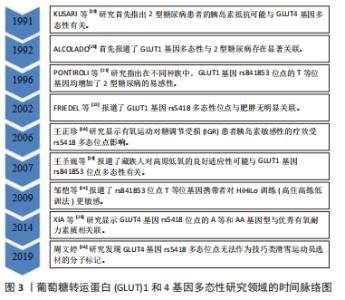Chinese Journal of Tissue Engineering Research ›› 2023, Vol. 27 ›› Issue (5): 745-750.doi: 10.12307/2023.113
Previous Articles Next Articles
The relationship between glucose transporter 1/4 gene polymorphisms and athletic ability
Zhou Yinan1, Yang Kun2, Jiang Jiayi3, Zhang Sizhuo4, Zhu Yingwen5
- 1Department of Physical Education, Tongji University, Shanghai 200092, China; 2Henan Technician College of Medicine and Health, Kaifeng 475000, Henan Province, China; 3Monash University, Melbourne, VIC3800, Australia; 4Wuhan Business University, Wuhan 430056, Hubei Province, China; 5Department of Physical Education, Shanghai Jiao Tong University, Shanghai 200240, China
-
Received:2022-03-16Accepted:2022-05-06Online:2023-02-18Published:2022-07-23 -
About author:Zhou Yinan, Master, Lecturer, Department of Physical Education, Tongji University, Shanghai 200092, China -
Supported by:Shanghai “Eagle Plan” for Sports Science and Technology, No. 19C008 (to ZYN); Shanghai “Take-off Plan” for Sports Science and Technology, No. 16T005 (to ZYN); Major Basic Research Project for Science and Technology Innovation Action of Shanghai Science and Technology Commission, No. 16JC1400503 (to ZYW [project participant])
CLC Number:
Cite this article
Zhou Yinan, Yang Kun, Jiang Jiayi, Zhang Sizhuo, Zhu Yingwen. The relationship between glucose transporter 1/4 gene polymorphisms and athletic ability[J]. Chinese Journal of Tissue Engineering Research, 2023, 27(5): 745-750.
share this article
Add to citation manager EndNote|Reference Manager|ProCite|BibTeX|RefWorks
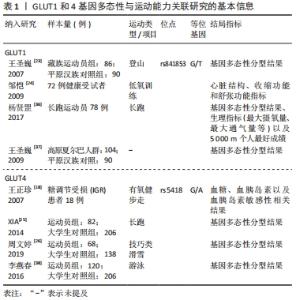
2.2 GLUT1和4基因及其多态性 GLUT1是肌肉中参与糖转运的重要蛋白,具有不依赖胰岛素水平的特征。GLUT1基因位于1号染色体短臂3区1带3亚带-3区5带(1p31.3-p35),基因全长约为33.8 kb,包含10个外显子和9个内含子。以往研究对GLUT1基因的多个位点进行了探索,如rs1130214、rs2494732、rs710218和rs841853等,其中以rs841853多态位点报道最多。rs841853位点位于第二内含子中,包含两类等位基因(G/T)以及3种基因型,分别为GG、GT和TT。rs841853位点多态性与糖尿病与糖尿病肾病存在显著关联,其中T等位基因被认为是该疾病的危险因素[27-28]。DU等[29]的研究显示rs841853位点多态性与2型糖尿病之间的关联具有人群特异性。T等位基因会增加亚洲人对2型糖尿病的易感性,然而对于黑人群体而言可能是保护因素。在高加索和突尼斯人群的调查结果中,前者显示rs841853位点多态性与高加索人群2型糖尿病易感性无明显关联[30],而后者显示 GT 基因型可将突尼斯人2型糖尿病易感性风险增加2.4倍[31],这提示该位点多态性对2型糖尿病的影响可能受种族因素影响。另外,还有研究指出rs841853位点多态性与低氧适应性存在一定关联,其中携带GT和TT基因型的个体对低氧环境具有更好的适用性[23]。 GLUT4作为骨骼肌细胞中葡萄糖跨膜转运的重要介质,对糖代谢起主要的限速作用。人体的GLUT4基因位于17号染色体短臂1区3带(17p13),基因全长为6.3 kb,包含11个外显子和10个内含子。在核苷酸序列的同源性方面,GLUT4基因与GLUT1、2和3分别具有65%,54%和58%的同源性。另外,GLUT4基因序列具有高度的保守性,研究指出大鼠和小鼠GLUT4的核苷酸序列与人类的同源性分别为95%和96%[32]。目前GLUT4有多个多态标记,然而主要集中于rs5418,该位点位于基因启动子区的-30 bp处,具体为G碱基-A碱基的变异,与糖代谢的相关报道较多。它包含两类等位基因(A/G)以及3种基因型,分别为AA、AG和GG。既往研究显示携带G等位基因和GG基因型不利于葡萄糖的转运和利用,并与2型糖尿病存在关联;而携带AA基因型更利于葡萄糖代谢和调节[33]。 MALODOBRA-MAZUR等[34]通过纳入2型糖尿病患者和正常人群(对照组),观察了GLUT4基因的SNPs与该基因在脂肪组织中表达率之间的关系,结果显示在rs5418位点中,携带AA基因型对照组的GLUT4 mRNA的表达量显著高于携带GG基因型的2型糖尿病人群,提示rs5418位点多态性与GLUT4基因表达存在关联。 2.3 GLUT1和4基因多态性与运动能力的相关研究 既往研究常常将基因多态性与运动能力中的有氧耐力素质、力量型素质和训练敏感性进行关联[35]。此次研究将从以上运动能力的3个方面对GLUT1和4基因多态性之间的关联展开论述(相关研究的基本特征见表1)。 "

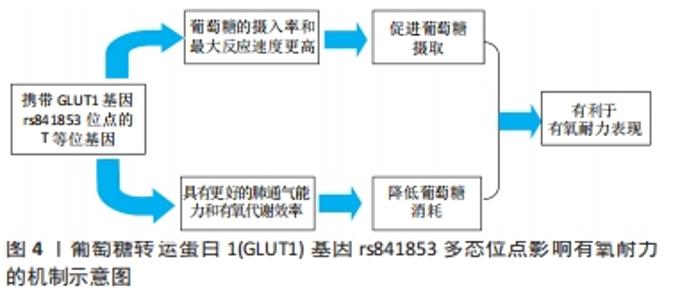
2.3.1 GLUT1基因多态性与运动能力 在有氧耐力素质方面,王圣巍等[23]在一项针对86例藏族登山运动员和90例平原汉族人rs841853位点多态性的研究中发现,登山运动员TT、GT两种基因型分布频率为9.3%和46.5%(平原组分别为2.2%和31.1%),T等位基因的分布频率是32.6%(平原组为17.8%),组间差异有统计学意义;该研究还通过OR值(优势比)比较了两组携带T等位基因的概率差异,结果显示OR=2.23,提示登山运动员携带T等位基因的概率是平原组的2.23倍。杨贤罡等[36]纳入78名汉族中国女子优秀长跑运动员与88名普通汉族人,通过病例-对照的方法对GLUT1基因rs841853位点多态性进行了研究,结果显示女子长跑运动员携带的GT+TT基因型和T等位基因的分布频率与普通人存在显著的统计学差异;另外,携带GT+TT基因型的女子长跑运动员在无氧阈摄氧量/最大摄氧量(VO2AT/VO2MAX)、最大通气量(VE)和5 000 m成绩优于GG型基因携带者。另外,还有文献指出运动耐力和低氧适应性很强的夏尔巴人群在rs841853位点多态性分布方面与平原汉族人群有较大差异,结果显示以基因型GT+TT基因型为暴露因素,夏尔巴人群携带该基因型的可能性是平原汉族人的2.16倍[37]。 在运动敏感性方面,邹恺等[24]通过对72名北方汉族健康男性进行了为期4周的高住高练低训(是一种训练者在人工低氧环境中接受常氧训练和低氧训练相结合的运动方式),并以左心室功能为评估指标,进而探讨rs841853位点多态性与训练效果之间的关联,结果显示在左心室收缩与舒张功能方面,携带T等位基因人群在训练前后短轴缩短率(SF)、左心室收缩末期容积(ESV)的减少量和E峰减速时间(EDT)的增加量显著高于G等位基因携带人群。以上结果表明携带T等位基因人群经过高住高练低训后心脏的收缩与舒张功能更优,提示该人群具有更高的低氧运动敏感性。 2.3.2 GLUT4基因多态性与运动能力 在有氧耐力素质方面,XIA等[25]对102名优秀长跑运动员和206名普通大学生rs5418位点多态性的分布特征进行了对照研究,结果发现GLUT4基因rs5418位点的A等位基因和AA基因型在长跑运动员中的分布频率是61.8%和74.5%,显著高于大学生组,也提示该位点的A等位基因和AA基因型与优秀有氧耐力素质相关联。李燕春等[38]通过比较中长距离游泳运动员和普通大学生GLUT4基因rs5418位点多态性的分布特征,分析了该位点多态性与游泳运动能力的关联,结果显示,与普通大学生组相比,游泳运动员携带的A等位基因和AA、AA+AG基因型分布频率更高,G等位基因和GG、GG+AG基因型分布频率更低,差异有统计学意义,结果提示携带A等位基因,尤其是AA纯合型可作为游泳运动项目选材的优势基因型。 在力量素质方面,有研究将GLUT4基因rs5418多态位点和技巧类滑雪进行关联,结果显示技巧类滑雪运动员rs5418位点的基因型和等位基因分布频率与对照组相比均无统计学差异[26],说明该位点多态性可能无法作为技巧类滑雪运动员选材的分子标记。 在运动敏感性方面,王正珍[18]通过对糖调节受损(IGR)患者进行有氧运动干预,观察胰岛素敏感性的变化,进而探索rs5418位点多态性和训练效果之间的关联,结果显示与AG+GG基因型携带者相比,AA基因型携带者的餐后2 h血糖、胰岛素敏感指数(HOMA-ISI)、胰岛素抵抗指数(HOMA-IR)在6周有氧有氧运动干预后改善更为显著,提示AA基因型对有氧运动的敏感性更强。 综上所述,既往研究对GLUT1基因rs841853位点和GLUT4基因 rs5418两个位点与运动能力进行了关联研究,结果显示两者均与有氧耐力素质、训练敏感性存在关联。 2.4 GLUT1和4基因多态性影响运动能力的可能机制 葡萄糖是生物体内重要的能量来源,有研究显示糖原缺乏容易诱导肌肉产疲劳和神经疲劳的出现,进而影响运动表现。还有研究指出在体内补充葡萄糖可以有效改善有氧运动后的乳酸清除能力和心率的恢复,并延迟运动性疲劳的出现[39-40]。综上,葡萄糖对于维持运动状态和运动表现的稳定性至关重要。GLUT1和4作为葡萄糖跨膜转运的重要成员,通过转位至细胞膜外与葡萄糖结合,进而将葡萄糖移至细胞内以维持机体的血糖平衡。多数研究指出葡萄糖的摄取量与GLUT1和4的表达密切相关[41-42],同时考虑到葡萄糖摄取对于运动能力的影响,因此GLUT1和4基因多态性与运动能力的内在联系可主要通过不同等位基因对GLUT1和4基因表达和葡萄糖的摄取利用等方面进行探讨。 2.4.1 GLUT1基因多态性影响运动能力的可能机制 葡萄糖摄取增加和消耗降低对于有氧耐力能力至关重要。李颖健等[43]发现rs841853位点不同基因型携带人群皮肤的成纤维细胞对葡萄糖的摄入率和动力存在差异,即T等位基因携带者的成纤维细胞对葡萄糖的摄入率和最大反应速度均显著高于G等位基因携带者,提示T等位基因对葡萄糖的摄取能力更强;该研究结果还显示葡萄糖摄取率的提高的主要与GLUT1 mRNA表达增加有关。同时,杨贤罡等[36]研究指出T等位基因的女子长跑运动员的肺通气功能和长跑能力显著优于G等位基因长跑运动员。根据以往的文献可知葡萄糖在人体的储备是有限的[44-45],而优秀的肺通气能力往往具有高效的有氧代谢效率,可通过最大程度减少葡萄糖的消耗进而延缓运动疲劳并保持良好的有氧耐力运动能力。综上,rs841853多态位点可能调控葡萄糖摄取和消耗进而影响有氧耐力素质(机制示意图见图4)。另外,还考虑到rs841853位点位于内含子区,虽然它不具备直接参与编码氨基酸的功能,但也可能通过连锁一些其他未知的SNPs进而影响该基因mRNA和蛋白的表达,最终影响运动能力。 "
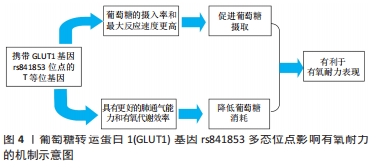
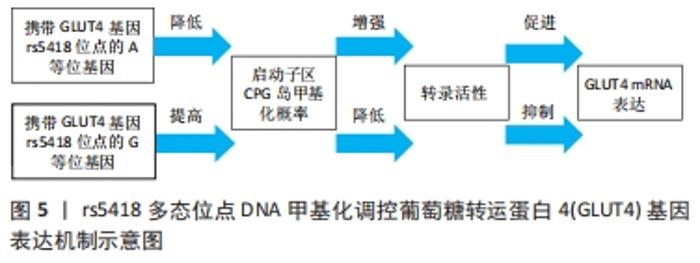
由邹恺等[24]研究可知GLUT1基因rs847853位点多态性与低氧运动诱导的心室功能存在关联,其原因可能与缺氧诱导因子1α(hypoxia inducible factor-1,HIF-1α)的调控相关。朱鸿明等[46]通过细胞实验证实骨髓间充质干细胞的葡萄糖摄取能力经过低氧预处理后可显著提高,其机制的关键在于HIF-1α的mRNA表达上调。HIF-1α是维持人体氧稳态的重要调控转录因子,在低氧环境中该因子因降解通路被抑制而在细胞核内聚集,并通过与β亚基和缺氧反应元件结合,一方面导致HIF-1α的mRNA和蛋白表达迅速提高,另一方面调节人体更好地适应低氧环境。有研究指出HIF-1α的上调有助于机体抗氧化能力的增强并减少运动损伤[47]。GLUT1基因是HIF-1α的下游作用靶点,大多数研究表明GLUT1的蛋白和mRNA表达与HIF-1α的表达呈正相关[48-50],即GLUT表达随HIF-1α的表达升高而升高。因此在低氧环境中,rs847853多态位点的不同基因型可能通过影响HIF-1α导致GLUT1表达出现差异,进而影响心肌细胞对葡萄糖的摄取,最终影响运动能力和生理状态的改变。 2.4.2 GLUT4基因多态性影响运动能力的可能机制 GLUT4基因rs5418多态位点与有氧耐力运动素质的关联机制在于该位点对GLUT4基因表达的调控作用。rs5418处于启动子区中,其碱基的变异(G/A)直接影响了该基因的转录与翻译效率,进而促进GLUT4在细胞内的高表达[51]。体外实验显示与G等位基因相比,携带A等位基因的重组质粒发动下游报告基因方面活性更强,从而促进GLUT4基因表达更为迅速[52]。综上,rs5418位点的碱基变异的确会造成GLUT4基因表达差异,其原因可能与DNA甲基化和启动子区内转录因子的调控有关。在DNA甲基化方面 (具体的甲基化示意图见图5),携带A等位基因时启动子区CPG岛的甲基化概率显著降低,转录活性进而得以增强,有利于GLUT4 mRNA的表达[53];而携带G等位基因则相反,即CPG岛的甲基化概率显著增加,转录活性进而得以抑制。研究表明G等位基因携带者的糖调节能力相较于A等位基因携带者更有限,其原因与GLUT4基因高甲基化有关[54-55]。在转录因子方面,肌细胞增强因子2(MEF-2)已被证实在调节GLUT4基因转录方面起着核心作用。肌细胞增强因子2和GLUT4增强因子(GEF)、成肌调节因子(MyoD) 等其他转录因子产生复杂的交互作用,进而促进GLUT4基因转录的激活[56]。故rs5418多态位点可能通过影响启动子区转录因子的协同作用进而参与GLUT4基因的表达,最终影响运动能力。另外,还有研究指出rs5418位点所在的区域有很多重要的可用于调控GLUT4转录的功能元件,这些元件可影响mRNA的翻译效率[34]。该多态位点可能通过影响功能元件的进而影响GLUT4 mRNA的翻译,导致基因表达出现差异。受研究数量影响,相关结果及机制需进一步证实。 "

| [1] BALTAZAR-MARTINS G, GUTIéRREZ-HELLíN J, AGUILAR-NAVARRO M, et al. Effect of ACTN3 Genotype on Sports Performance, Exercise-Induced Muscle Damage, and Injury Epidemiology. Sports (Basel). 2020;8(7):99. [2] MACNAMARA BN, HAMBRICK DZ, OSWALD FL. Deliberate practice and performance in music, games, sports, education, and professions: a meta-analysis. Psychol Sci. 2014;25(8):1608-1618. [3] GOLDSTEIN DB, CAVALLERI GL. Genomics: understanding human diversity. Nature. 2005;437(7063):1241-1242. [4] VECCHIO M, CURRò M, TRIMARCHI F, et al. The Oxidative Stress Response in Elite Water Polo Players: Effects of Genetic Background. Biomed Res Int. 2017;2017:7019694. [5] REDONDO N, NAVARRO D, AGUADO JM, et al. Human genetic polymorphisms and risk of viral infection after solid organ transplantation. Transplant Rev (Orlando). 2022;36(1):100669. [6] MCAULEY A, HUGHES DC, TSAPROUNI LG, et al. The association of the ACTN3 R577X and ACE I/D polymorphisms with athlete status in football: a systematic review and meta-analysis. J Sports Sci. 2021;39(2):200-211. [7] 艾金伟,刘盈,李德胜,等.ACE基因插入/缺失多态性与运动员耐力型运动能力关联性的Meta分析[J].中国循证医学杂志,2016,16(4):392-402. [8] 孔海军,潘道雍,高可丽,等.CKMM基因A/G多态性与耐力、力量速度、混合型运动能力关联性的Meta分析[J].科学技术与工程,2021,21(2):629-637. [9] IPEKOGLU G, BULBUL A, CAKIR HI. A meta-analysis on the association of ACE and PPARA gene variants and endurance athletic status. J Sports Med Phys Fitness. 2021;5:1-25. [10] 桂曌环,孙风华,王香生,等.运动前碳水化合物摄入与底物利用:血糖指数与果糖含量的短期影响[J].中国运动医学杂志,2016,35(9):869-880. [11] NAHARUDIN MN, ADAMS J, RICHARDSON H, et al. Viscous placebo and carbohydrate breakfasts similarly decrease appetite and increase resistance exercise performance compared with a control breakfast in trained males. Br J Nutr. 2020;16:1-9. [12] HAMADA N, WADAZUMI T, HIRATA Y, et al. Single Ingestion of Trehalose Enhances Prolonged Exercise Performance by Effective Use of Glucose and Lipid in Healthy Men. Nutrients. 2021;13(5):1439. [13] TANG M, GAO G, RUEDA CB, et al. Brain microvasculature defects and Glut1 deficiency syndrome averted by early repletion of the glucose transporter-1 protein. Nat Commun. 2017;8:14152. [14] KURABAYASHI A, FURIHATA K, IWASHITA W, et al. Murine remote ischemic preconditioning upregulates preferentially hepatic glucose transporter-4 via its plasma membrane translocation, leading to accumulating glycogen in the liver. Life Sci. 2022;290:120261. [15] SINGH A, KALITA B C. A Study of Association of XBAI GLUT1 Gene Polymorphism in Patients of Type 2 Diabetes Mellitus with Diabetic Nephropathy. J Assoc Physicians India. 2020;68(1):50. [16] LI Y, YANG J, TAO W, et al. The Single Nucleotide Polymorphisms (rs1292037 and rs13137) in miR-21 Were Associated with T2DM in a Chinese Population[J]. Diabetes Metab Syndr Obes. 2022;15:189-198. [17] XU C, YANG X, WANG Y, et al. An analysis of the polymorphisms of the GLUT1 gene in urothelial cell carcinomas of the bladder and its correlation with p53, Ki67 and GLUT1 expressions. Cancer Gene Ther. 2017;24(7):297-303. [18] 王正珍.有氧运动对糖调节受损人群胰岛素敏感性影响效果的研究[D].北京:北京体育大学,2006. [19] KUSARI J, VERMA US, BUSE JB, et al. Analysis of the gene sequences of the insulin receptor and the insulin-sensitive glucose transporter (GLUT-4) in patients with common-type non-insulin-dependent diabetes mellitus. J Clin Invest. 1991;88(4):1323-1330. [20] ALCOLADO JC, BARONI MG. Restriction fragment length polymorphisms at the GLUT4 and GLUT1 gene loci in type 2 diabetes. Diabet Med. 1992;9(1):58-60. [21] PONTIROLI A E, CAPRA F, VEGLIA F, et al. Genetic contribution of polymorphism of the GLUT1 and GLUT4 genes to the susceptibility to type 2 (non-insulin-dependent) diabetes mellitus in different populations. Acta Diabetol. 1996; 33(3):193-197. [22] FRIEDEL S, ANTWERPEN B, HOCH A, et al. Glucose transporter 4 gene: association studies pertaining to alleles of two polymorphisms in extremely obese children and adolescents and in normal and underweight controls. Ann N Y Acad Sci. 2002;967:554-557. [23] 王圣巍,孙学川,刘坤祥,等.葡萄糖转运体1基因多态性与低氧适应性的关系[J].生物医学工程学杂志,2007,24(2):425-429. [24] 邹恺,胡扬,衣龙燕. GLUT1基因SNP/G22999T多态位点作为预测HiHiLo对左心室结构和功能影响效果的分子标记的研究[J].中国运动医学杂志, 2009,28(6):616-621. [25] XIA X, HU Y, XU L, et al. A functional promoter polymorphism of SLC2A4 is associated with aerobic endurance in a Chinese population. Eur J Sport Sci. 2014;14(1):53-59. [26] 周文婷.有氧能力关联基因多态与技巧类滑雪运动员跨项选材[J].武汉体育学院学报,2019,53(6):66-71. [27] 石之驎,王沙燕,刘泽林,等.葡萄糖转运蛋白1基因多态性与2型糖尿病的关系[J].广东医学,2006,27(1):87-88. [28] VIJAYA PADMA V, ANITHA S, SANTHINI E, et al. Mitochondrial and nuclear gene mutations in the type 2 diabetes patients of Coimbatore population. Mol Cell Biochem. 2010;345(1-2):223-229. [29] DU B, LIU S, CUI C, et al. Association between glucose transporter 1 rs841853 polymorphism and type 2 diabetes mellitus risk may be population specific (1rs8418532). J Diabetes. 2013;5(3):291-299. [30] GUTIERREZ C, VENDRELL J, PASTOR R, et al. GLUT1 gene polymorphism in non-insulin-dependent diabetes mellitus: genetic susceptibility relationship with cardiovascular risk factors and microangiopathic complications in a Mediterranean population. Diabetes Res Clin Pract. 1998;41(2):113-120. [31] MAKNI K, MNIF F, BOUDAWARA M, et al. Association of glucose transporter 1 polymorphisms with type 2 diabetes in the Tunisian population. Diabetes Metab Res Rev. 2008;24(7):544-548. [32] 黄年旭,李玲.葡萄糖转运蛋白4的研究进展[J].中国药物与临床,2008, 8(12):925-928. [33] NAIR AK, SUGUNAN D, KUMAR H, et al. Case-control analysis of SNPs in GLUT4, RBP4 and STRA6: association of SNPs in STRA6 with type 2 diabetes in a South Indian population. PLoS One. 2010;5(7):e11444. [34] MALODOBRA-MAZUR M, BEDNARSKA-CHABOWSKA D, OLEWINSKI R, et al. Single nucleotide polymorphisms in 5’-UTR of the SLC2A4 gene regulate solute carrier family 2 member 4 gene expression in visceral adipose tissue. Gene. 2016;576(1 Pt 3):499-504. [35] WANG G, PADMANABHAN S, WOLFARTH B, et al. Genomics of elite sporting performance: what little we know and necessary advances. Adv Genet. 2013; 84:123-149. [36] 杨贤罡,李燕春,邓潇潇.中国女子长跑运动员GLUT1基因rs841853位点多态性与运动能力之间的关联性[J].北京体育大学学报,2017,40(12):45-49+138. [37] 王圣巍,孙学川,闫惠琴,等.GLUT1基因单核苷酸多态性与夏尔巴人群高原低氧适应的关系[J].第四军医大学学报,2009,30(6):558-560. [38] 李燕春,杨贤罡,龚丽景,等.中国中长距离游泳运动员葡萄糖转运蛋白4基因多态性关联研究[J].北京体育大学学报,2016,39(5):37-40. [39] MAUNDER E, BRADLEY HE, DEANE CS, et al. Effects of short-term graded dietary carbohydrate intake on intramuscular and whole body metabolism during moderate-intensity exercise. J Appl Physiol (1985). 2021;131(1):376-387. [40] GONZALEZ JT, WALLIS GA. Carb-conscious: the role of carbohydrate intake in recovery from exercise. Curr Opin Clin Nutr Metab Care. 2021;24(4):364-371. [41] FAJARDO VM, FENG I, CHEN BY, et al. GLUT1 overexpression enhances glucose metabolism and promotes neonatal heart regeneration. Sci Rep. 2021;11(1): 8669. [42] RAHIMI R, MALEK I, LERRER-GOLDSHTEIN T, et al. TMF1 is upregulated by insulin and is required for a sustained glucose homeostasis. FASEB J. 2021;35(2):e21295. [43] 李颖健,刘志红,胡可斌,等.葡萄糖转运蛋白1基因多态性对成纤维细胞糖代谢的影响[J].中华医学杂志,2001,81(4):46-47. [44] LI B, JIA M, WANG Y, et al. Differences of Plasma Metabolites in Prediabetes with Different Cardiorespiratory Fitness and the Effects of Exercise. Med Sci Sports Exerc. 2019;51(6S):477. [45] 李博文.不同心肺耐力的糖尿病前期人群血浆代谢物的差异及运动干预的影响[D].北京:北京体育大学,2018. [46] 朱鸿明,陈晓禾,邓力.低氧预处理对大鼠BMSCs葡萄糖代谢的影响[J].中国修复重建外科杂志,2011,25(8):1004-1007. [47] 龚俊艳,赵成玉.持续性低氧对糖代谢的调节机制的研究进展[J].中国全科医学,2018,21(12):1497-1503. [48] 唐雯,龙婷婷,李芳芳,等.HIF-1α可能通过增加CD147和GLUT1的表达促进寻常型银屑病的糖酵解过程(英文)[J].中南大学学报(医学版),2021, 46(4):333-344. [49] 杨通印,郝朗松,郭德正.缺氧诱导因子1α、葡萄糖转运蛋白1和乳酸脱氢酶5在结直肠癌的表达及其意义[J].中华病理学杂志,2017,46(2):93-97. [50] ŻYROMSKA A, ANDRUSEWICZ H, ŁYSIK J, et al. Differential relationship between two hypoxia markers: HIF-1α and GLUT1 and classic prognostic factors in invasive breast carcinoma. Current Gynecologic Oncology. 2016;14(4):197-203. [51] PESOLE G, GRILLO G, LARIZZA A, et al. The untranslated regions of eukaryotic mRNAs: structure, function, evolution and bioinformatic tools for their analysis. Brief Bioinform. 2000;1(3):236-249. [52] 夏小慧,胡扬,张腾国,等.SLC2A4基因启动子区rs5418位点变异对基因表达的影响[J].中国病理生理杂志,2012,28(10):1791-1795. [53] BJøRBAEK C, ECHWALD SM, HUBRICHT P, et al. Genetic variants in promoters and coding regions of the muscle glycogen synthase and the insulin-responsive GLUT4 genes in NIDDM. Diabetes. 1994;43(8):976-983. [54] 李梅,李南方,吴婷,等.高血压合并阻塞性睡眠呼吸暂停综合征患者中葡萄糖转运蛋白4 DNA高甲基化[J].中华高血压杂志,2016,24(8):751-757. [55] XI C, MIYAKI K, IKEDA S, et al. Association of GLUT4 gene variants with HbA1c level in Japanese men. Endocr J. 2012;59(8):677-684. [56] YUE Y, ZHANG C, ZHAO X, et al. Tiam1 mediates Rac1 activation and contraction-induced glucose uptake in skeletal muscle cells. FASEB J. 2021;35(2):e21210. [57] 柳杨青,汪艳芳.敲除MSTN基因可上调骨骼肌胰岛素信号通路并减轻2型糖尿病小鼠胰岛素抵抗[J]. 中国病理生理杂志,2021,37(11):1957-1964. [58] JALDIN-FINCATI JR, PAVAROTTI M, FRENDO-CUMBO S, et al. Update on GLUT4 Vesicle Traffic: A Cornerstone of Insulin Action. Trends Endocrinol Metab. 2017; 28(8):597-611. |
| [1] | Pan Zhongjie, Qin Zhihong, Zheng Tiejun, Ding Xiaofei, Liao Shijie. Targeting of non-coding RNAs in the pathogenesis of the osteonecrosis of the femoral head [J]. Chinese Journal of Tissue Engineering Research, 2023, 27(9): 1441-1447. |
| [2] | Cai Zhihao, Xie Zhaoyong. Femoral neck anteversion measurement assessment: how to establish a unified method and standard [J]. Chinese Journal of Tissue Engineering Research, 2023, 27(9): 1448-1454. |
| [3] | Dang Yi, Du Chengyan, Yao Honglin, Yuan Nenghua, Cao Jin, Xiong Shan, Zhang Dingmei, Wang Xin. Hormonal osteonecrosis and oxidative stress [J]. Chinese Journal of Tissue Engineering Research, 2023, 27(9): 1469-1476. |
| [4] | Xu Xingxing, Wen Chaoju, Meng Maohua, Wang Qinying, Chen Jingqiao, Dong Qiang. Carbon nanomaterials in oral implant [J]. Chinese Journal of Tissue Engineering Research, 2023, 27(7): 1062-1070. |
| [5] | Li Cheng, Zheng Guoshuang, Kuai Xiandong, Yu Weiting. Alginate scaffold in articular cartilage repair [J]. Chinese Journal of Tissue Engineering Research, 2023, 27(7): 1080-1088. |
| [6] | Chen Shisong, Liu Xiaohong, Xu Zhiyun. Current status and prospects of bioprosthetic heart valves [J]. Chinese Journal of Tissue Engineering Research, 2023, 27(7): 1096-1102. |
| [7] | Lu Di, Zhang Cheng, Duan Rongquan, Liu Zongxiang. Osteoinductive properties of calcium phosphate ceramic bone repair materials [J]. Chinese Journal of Tissue Engineering Research, 2023, 27(7): 1103-1109. |
| [8] | Shi Yehong, Wang Cheng, Chen Shijiu. Early thrombosis and prevention of small-diameter blood vessel prosthesis [J]. Chinese Journal of Tissue Engineering Research, 2023, 27(7): 1110-1116. |
| [9] | Tang Haotian, Liao Rongdong, Tian Jing. Application and design of piezoelectric materials for bone defect repair [J]. Chinese Journal of Tissue Engineering Research, 2023, 27(7): 1117-1125. |
| [10] | Li Yujiao, Su Kunxia. High-intensity endurance exercise influences browning of white adipose tissue in a mouse model of high-fat diet induced obesity [J]. Chinese Journal of Tissue Engineering Research, 2023, 27(5): 707-713. |
| [11] | Xiong Bohan, Yu Yang, Lu Xiaojun, Wang Xu, Yang Tengyun, Zhang Yaozhang, Liao Xinyu, Zhou Xiaoxiang, He Lu, Li Yanlin. Research progress in promoting tendon to bone healing during anterior cruciate ligament reconstruction [J]. Chinese Journal of Tissue Engineering Research, 2023, 27(5): 779-786. |
| [12] | Liu Yuan. Effect of hypoxic training on the oxygen sensing pathway [J]. Chinese Journal of Tissue Engineering Research, 2023, 27(5): 793-798. |
| [13] | Tao Xin, Xu Yi, Song Zhiwen, Liu Jinbo. Hippo signaling pathway in the regulation of spinal cord injury [J]. Chinese Journal of Tissue Engineering Research, 2023, 27(4): 619-625. |
| [14] | Li Shihao, Li Qi, Li Zhen, Zhang Yuanyuan, Liu Miaomiao, Ouyang Yi, Xu Weiguo. Plantar pressure and gait analysis in patients with anterior cruciate ligament injury and reconstruction [J]. Chinese Journal of Tissue Engineering Research, 2023, 27(4): 626-631. |
| [15] | Zhou Jie, Pei Xibo, Wan Qianbing. Advances and biological application of asymmetric dressings [J]. Chinese Journal of Tissue Engineering Research, 2023, 27(3): 434-440. |
| Viewed | ||||||
|
Full text |
|
|||||
|
Abstract |
|
|||||
